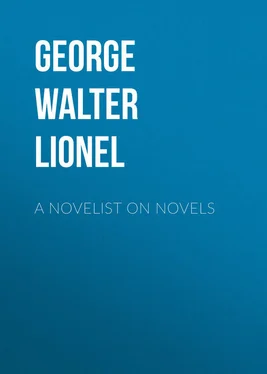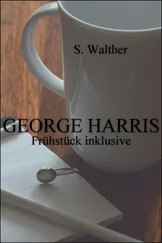Walter George - A Novelist on Novels
Здесь есть возможность читать онлайн «Walter George - A Novelist on Novels» — ознакомительный отрывок электронной книги совершенно бесплатно, а после прочтения отрывка купить полную версию. В некоторых случаях можно слушать аудио, скачать через торрент в формате fb2 и присутствует краткое содержание. Жанр: foreign_antique, foreign_prose, foreign_sf, на английском языке. Описание произведения, (предисловие) а так же отзывы посетителей доступны на портале библиотеки ЛибКат.
- Название:A Novelist on Novels
- Автор:
- Жанр:
- Год:неизвестен
- ISBN:нет данных
- Рейтинг книги:3 / 5. Голосов: 1
-
Избранное:Добавить в избранное
- Отзывы:
-
Ваша оценка:
- 60
- 1
- 2
- 3
- 4
- 5
A Novelist on Novels: краткое содержание, описание и аннотация
Предлагаем к чтению аннотацию, описание, краткое содержание или предисловие (зависит от того, что написал сам автор книги «A Novelist on Novels»). Если вы не нашли необходимую информацию о книге — напишите в комментариях, мы постараемся отыскать её.
A Novelist on Novels — читать онлайн ознакомительный отрывок
Ниже представлен текст книги, разбитый по страницам. Система сохранения места последней прочитанной страницы, позволяет с удобством читать онлайн бесплатно книгу «A Novelist on Novels», без необходимости каждый раз заново искать на чём Вы остановились. Поставьте закладку, и сможете в любой момент перейти на страницу, на которой закончили чтение.
Интервал:
Закладка:
So literary genius must, as before, look for its endowment in the somewhat barren heart of man, and continue to shed a hundred seeds in its stony places, in the forlorn hope that the fowls of the air may not devour them all, and that a single ear of corn may wilt and wither its way into another dawn.
The reading of most men and women provides distressing lists. So far as I can gather from his conversation, the ordinary, busy man, concerned with his work, finds his mental sustenance in the newspapers, particularly in Punch , in the illustrated weeklies and in the journals that deal with his trade; as for imaginative literature, he seems to confine himself to Mr Nat Gould, Sir Arthur Conan Doyle, Mr W. W. Jacobs, Mr Mason, and such like, who certainly do not strain his imaginative powers; he is greatly addicted to humour of the coarser kind, and he dissipates many of his complexes by means of vile stories which he exchanges with his fellows; these do not at all represent his kindliness and his respectability. Sometimes he reads a shocker, the sort that is known as 'railway literature,' presumably because it cannot hold the attention for more than the time that elapses between two stops.
The more serious and scholarly man, who abounds in every club, is addicted to the monthly reviews, (price two-and-six; he does not like the shilling ones), to the Times , to the Spectator ; that kind of man is definitely stodgy and prides himself upon being sound. He is fond of memoirs, rather sodden accounts of aristocrats and politicians, of the dull, ordinary lives of dull, ordinary people; when he has done with the book it goes to the pulping machine, but some of the pulp gets into that man's brain. ('Ashes to ashes, pulp to pulp.') He likes books of travel, biographies, solid French books (strictly by academicians), political works, economic works. His conversation sounds like it, and that is why his wife is so bored; his emotions are reflex and run only round the objects he can see; art cannot touch him, and no feather ever falls upon his brow from an airy wing. He commonly tells you that good novels are not written nowadays; he must be excused that opinion, for he never tries to read them. The only novels with which the weary Titan refreshes his mind are those of Thackeray, sometimes of Trollope; the more frivolous sometimes go so far as to sip a little of the honey that falls from the mellifluous lips of Mr A. C. Benson.
The condition of women is different. They care for little that ends in 'ic,' and so their consumption of novels is enormous. The commonplace woman is attracted by the illustrated dailies and weeklies, but she also needs large and continuous doses of religious sentimentality, of papier maché romance, briefly, of novels described in literary circles as 'bilge,' such as the works of Mr Hall Caine, Mrs Barclay, Miss E. M. Dell, and a great many more; if she is of the slightly faster kind that gives smart lunch parties at the Strand Corner House, her diet is sometimes a little stronger; she takes to novels of the orchid house and the tiger's lair, to the artless erotics of Miss Elinor Glyn, Mr Hubert Wales, and Miss Victoria Cross. She likes memoirs too, memoirs of vague Bourbons and salacious Bonapartes; she takes great pleasure in the historical irregularities of cardinals. She likes poetry too as conveyed by Miss Ella Wheeler Wilcox.
If that type of woman were not a woman the arts could base as few hopes on her as they do on men, but the most stupid woman is better ground than the average man, because she is open, while he is smug. So it is no wonder that among the millions of women who mess and muddle their way through the conservatories and pigsties of literature, should be found the true reading public, the women who are worth writing for, who read the best English novels, who are in touch with French and Russian literature, who reads plays, and even essays, ancient and modern. Hail Mary, mother of mankind; but for these the arts must starve!
That fine public cannot carry us very far. They are not enough to keep literature vigorous by giving it what it needs: a consciousness of fellowship with many readers. If literature is to flourish (of which I am not sure, though endure in some form it will), the general public taste must be raised. I feel that taste can be raised and cultivated, and many have felt that too. From the middle of the nineteenth century onwards, and especially since 1870, an ascending effort has been made to stimulate the taste of the rising artisan. Books like Lord Avebury's Pleasures of Life , like Sesame and Lilies , collections such as the Hundred Best Books and the Hundred Best Pictures , have all been attuned to that key. The only pity is that the selections, nearly all of them excellent, were immeasurably above the heads of the public for which they were meant. Two recent instances are worth analysing. One of them is A Library for Five Pounds by Sir William Robertson Nicoll, (whom Mr Arnold Bennett delighteth to revile), the other Literary Taste and How to Form It , by Mr Bennett himself. Now Sir William Robertson Nicoll's book is much more sensible than the funereal lists available at most polytechnics. The author does not pretend that one should read Plato in one's bath; he seems to realise the state of mind of the ordinary, fairly busy, fairly willing, fairly intelligent person. A sign of it is that he selects only sixty-one works, and out of those allows twenty-seven novels. Of the rest, most are readable, except Pilgrim's Progress and The Origin of Species , a touching couple. The list is by far the best guide I have ever seen, but … there is not a living author in it. It is not a library, it is a necropolis. The novelists that Sir William Robertson Nicoll recommends are Scott, Jane Austen, Dickens, Thackeray, Charlotte Brontë, George Eliot, Hawthorne, Trollope, Blackmore, Defoe, and Swift. All their books are readable, but they do not take by the hand the person who has thought wrong or not thought at all. When you want to teach a child history you do not dump upon its desk Hume and Smollett, in forty volumes; you lead it by degrees, by means of text-books, that is according to plan . That is how I conceive literary education, but before suggesting a list, let us glance at Literary Taste and How to Form It . In this book the author shows himself much more unpractical and much less sympathetic than Sir William Robertson Nicoll (whom Mr Bennett delighteth to revile). The book itself is very interesting; it is bright, intelligent; it teaches you how to read, and how to make allowances for the classics; it tells you how you may woo your way to Milton, but, after all, when you have done, you find that you have not wooed your way an inch nearer. That is because Mr Arnold Bennett takes up to his public an attitude more highbrowed than I could imagine if I were writing a skit on his book. Mr Bennett's idea of a list for the aspirant to letters is to throw the London Library at his head; he lays before us a stodgy lump of two or three hundred volumes, many of them excellent, and many more absolutely penal. It is enough to say that he seriously starts his list with the Venerable Bede's Ecclesiastical History . Bede! the dimmest, most distant of English chroniclers, who depicts the dimmest and most distant period of English history; once, in an A.B.C., I saw a shopman reading Tono-Bungay , which was propped against the cruet. Does Mr Bennett imagine that man dropping the tear of emotion and the gravy of excitement upon the Venerable Bede? And if one goes on with the list and discovers the Autobiography of Lord Herbert of Cherbury , Religio Medici , Berkeley's Principles of Human Knowledge , Reynold's Discourses on Art , the works of Pope, Voyage of the Beagle … one comes to understand how such readers may have been made by such masters. From the beginning to the end of that list my mind is obsessed by the word 'stodge,' and the novels do not relieve it much. There are a good many, but they comprise the usual Thackeray, Scott, Dickens … need I go on? Relief is found only in Fielding, Sterne, and in one book each of Marryat, Lever, Kingsley, and Gissing. These authors are admitted presumably because they are dead.
Читать дальшеИнтервал:
Закладка:
Похожие книги на «A Novelist on Novels»
Представляем Вашему вниманию похожие книги на «A Novelist on Novels» списком для выбора. Мы отобрали схожую по названию и смыслу литературу в надежде предоставить читателям больше вариантов отыскать новые, интересные, ещё непрочитанные произведения.
Обсуждение, отзывы о книге «A Novelist on Novels» и просто собственные мнения читателей. Оставьте ваши комментарии, напишите, что Вы думаете о произведении, его смысле или главных героях. Укажите что конкретно понравилось, а что нет, и почему Вы так считаете.












